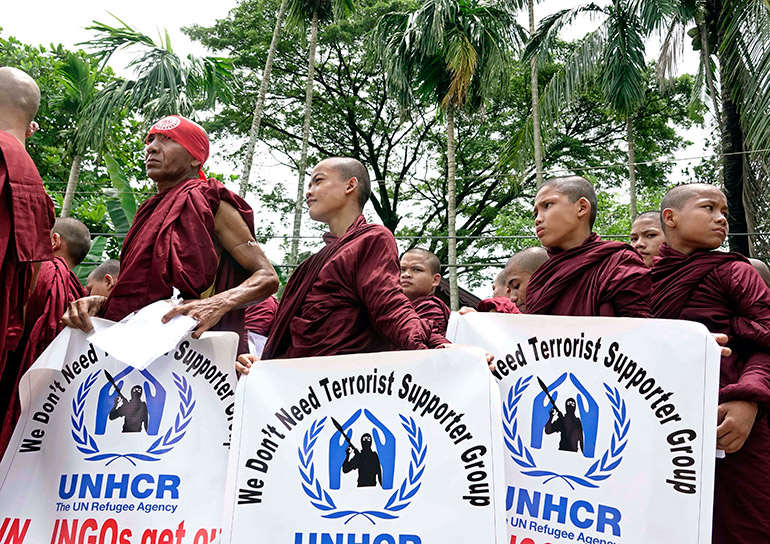Buddhist monks and residents demonstrated in 15 of 17 townships in Rakhine State on Sunday to demand a resolution to the security issues in the area and to keep out foreign aid agencies

More than 150,000 people took to the streets in western Myanmar on Sunday to protest against aid organisations they accuse of giving support to Muslim Rohingya militants, who are believed to be responsible for attacks against security forces in the area.
Buddhist monks and members of the majority Buddhist Rakhine ethnic group held protests in including the state capital of Sittwe, calling on aid agencies to leave immediately. Pictures shared online showed monks holding signs reading, “We don’t need terrorist supporter group,” and calling for the U.N. and international non-governmental organisations to “get out”.
There have been building tensions between the Myanmar government and the UN and human rights groups over the situation in Rakhine, where observers say that the military has responded to deadly attacks with sweeping operations allegedly involving systematic murder and rape.
The government has denied the allegations while preventing the UN and aid workers from accessing the area.
Sunday’s protests also called for greater enforcement of the the 1982 Myanmar Citizenship Law, the creation of armed local militias to ensure security and the elimination of “Bengali” terrorists, a reference to the Rohingya, who much of Myanmar refuse to recognise as citizens, according to the Myanmar Times.
Htay Aung, a self-described leader of the protests, told Reuters that the government was failing in its responsibility to protect of lives and property of its people.
“We will protest again and again until we get our demands. If the government fails to act, that is their responsibility” he said.
The protest has yet to result in any concrete promises from the state or national government, but continues the overall escalation of tension. In the past four days, the Myanmar government has declared a curfew in Rakhine and sent hundreds of soldiers to beef up security after seven Buddhists were found hacked to death in mountains near the town of Maungdaw last week, military sources said on Friday.
“We have to increase security operations because the security situation has worsened – some Muslims and Buddhists have been killed by the insurgents,” Rakhine State police chief Colonel Sein Lwin told Reuters.
Aung San Suu Kyi’s office issued a statement on 11 August about the current situation in Rakhine and said that lawful action would be taken against all extremists and those who help them.
“The government is handling the situation strictly within standing laws, rules and regulation. Security enforcement will be enhanced in the region” the statement said.
Asian Parliamentarians for Human Rights (APHR), an advocacy group comprised of regional lawmakers, voiced concern about the increased number of troops in Rakhine.
“Aung San Suu Kyi should call on all parties, including the Myanmar army, to take steps to de-escalate conflict in northern Rakhine State, rather than exacerbate it,” said Eva Kusuma Sundari, a member of APHR’s board, said in a statement.
The government has repeatedly reassured the international community that it is fully committed to promoting human rights for all communities, including those in Rakhine, though it has restricted access to foreign aid workers, observers and journalists.
“Mishandling would trigger instability and dispute unity and we need more positive approach without aggravating the problem,’’ National Security adviser U Thaung Tun told the diplomatic community and UN agencies in Yangon on 18 July.
About 1.1 million Rohingya Muslims live in Rakhine, but are denied citizenship and face restrictions on their movements and access to basic services. About 120,000 remain in camps set up in Myanmar after deadly violence swept the state in 2012. Tens of thousands more are believed to have fled the country after violence began to flare again last October.
Tens of thousands protest against aid agencies in Myanmar’s west
Buddhist monks and residents demonstrated in 15 of 17 townships in Rakhine State on Sunday to demand a resolution to the security issues in the area and to keep out foreign aid agencies

